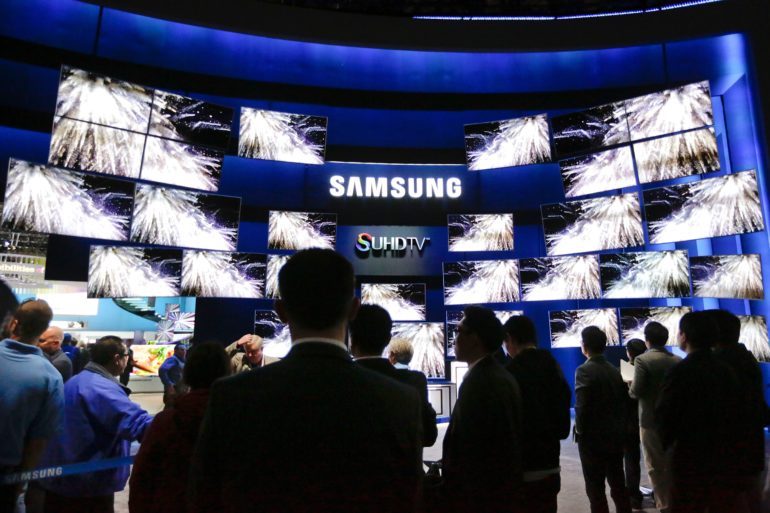Samsung to Add Google Assistant, Better Sound to 2019 TV Sets (EXCLUSIVE)
By Janko Roettgers
LOS ANGELES (Variety.com) – Samsung is preparing to integrate third-party voice assistants into its 2019 line of TV sets, Variety has learned from sources familiar with the company’s plans. The company may announce a partnership with Google to integrate Google Assistant as early as next month, when it will unveil next year’s TVs at the Consumer Electronics Show (CES) in Las Vegas.
is likely also going to put a bigger emphasis on audio quality, and could include technology that mimics the way Apple’s HomePod tunes music to its environment into some of its high-end TV sets. A Samsung spokesperson declined to comment on those features, and instead pointed to the announcement of 2019 models of Samsung’s the Frame and Serif TV models .
Samsung’s embrace of third-party voice assistants comes just months after the company added its own voice assistant Bixby to its 2018 TVs. However, the current integration of Bixby on TVs is fairly limited. Consumers can use the voice assistant to control playback of videos, but Bixby can’t yet open and control third-party apps.
The company has also not opened up Bixby development to third-party TV app developers, but plans to do so next year. “We are at the very early stage of development for Bixby for TV,” admitted Samsung senior staff engineer James Jung during a session at the company’s recent developer conference in San Francisco.
By adding third-party assistants, Samsung can offer developers more flexibility, and take advantage of the growing number of smart speakers to bring far-field voice control to TVs without built-in microphones. Emarketer estimated this week that 74.2 million people will use a smart speakers in 2019. Samsung introduced its very first Bixby smart speaker in 2018, but has not made the device available for sale yet.
According to Emarketer, Amazon is expected to capture around 63% of the smart speaker market in 2019, with Google coming in second with 31%. An Adobe Analytics report revealed this week that 63% of smart speaker owners have such a device in their living room . In other words: People are already using third-party voice assistants in proximity to their TVs, so it only makes sense for Samsung to plug into those ecosystems.
Samsung’s integration of third-party voice assistants is expected to be similar to the way competitors like LG and TCL have integrated these assistants. On LG TVs, consumers can access local weather, their calendar, and more through the Google Assistant, and also use the assistant to control smart home devices. However, universal search is still being handled by LG’s own software. This helps TV makers to build commercial relationships with app developers and service providers, and keeps them in control of a key aspect of their smart TV systems.
Samsung is also expected to emphasize sound quality as a key area of improvements over previous TV generations. The company registered for a number of trademarks in late November that are related to TV audio, including one for “ audio spatial intelligence ,” one for “ volume intelligence ,” and one for “ audio scenic intelligence .”
Audio spatial intelligence is being described as “software for televisions, namely, software for use in optimizing sound quality depending on the surrounding environment, such as space size and ambient noise,” whereas scenic intelligence improves TV sound quality based on the type of content users are watching.
Smart speakers like Apple’s HomePod and Google’s Home Max already automatically optimize sound based on their surroundings by monitoring music through built-in microphones. Sonos previously developed a technology to manually tune a speaker for the room it is placed in, which required consumers to wave their phone around while listening to test tones. It’s unclear whether Samsung will integrate microphones directly into its TV sets to optimize audio for consumers’ living rooms, or whether it will rely on a phone or remote control with integrated microphone to optimize these settings.
Samsung is also expected to further build out its TV Plus service, which presents over-the-top streaming channels in a linear-like environment. These types of offerings have seen significant growth in 2018, with Samsung content partner Jukin recently revealing that it was streaming more than 70 million minutes of linear OTT content to consumers per month.
TV Plus is important to Samsung because it allows the company to generate additional revenues after the sale of a TV set. Samsung has for some time tried to transform its smart TV system into a services business that would generate ancillary revenue streams, but the company has at times struggled to turn its TV software into more than just a way for consumers to launch Netflix and YouTube.
Case in point: Samsung acquired failed smart TV startup Boxee in 2013 to build an ambitious smart tvOS that would have replaced the traditional TV remote with a tablet for second-screen control — something that was internally known as “perfect experience.” However, the project was scrapped, and most of Boxee’s staff was laid off , before it ever shipped.
This year, the smart TV team saw another significant departure: content and services chief product officer Gilles BianRosa parted with the company over the summer, Variety has learned. BianRosa was hired in October 2016 from Tivo , and previously led the smart TV device startup Fan TV.

